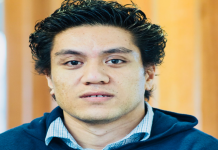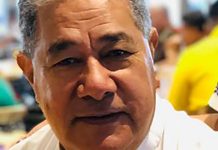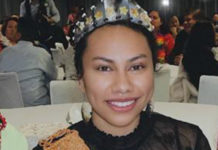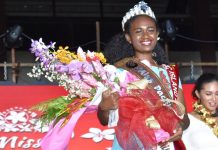By Carla Herreria, Huffington Post
When Veronica Pomeʻe auditioned for Sports Illustrated’s swimsuit model search last year, she knew that the magazine had never featured a Polynesian woman like herself in its famed annual edition.
She was determined to become the first one.
Pomeʻe, whose parents were born in the Kingdom of Tonga in the South Pacific, raised the issue during her audition at the Sports Illustrated casting call in Miami, where thousands of models showed up to nab one of 16 open spots for the next round.
“I remember my interview telling [Sports Illustrated senior editor Darcy Braun]: You guys travel to all these beautiful, exotic, tropical locations” to photograph swimsuit models, Pomeʻe said. “What better way [to honor that] than to feature someone who’s actually from there?”
By the end of the audition process, Pomeʻe had made the final cut of six models who would make it into the magazine. Nearly a year later, her dream became a reality as she became the first Polynesian model to be featured in Sports Illustrated’s swimsuit edition, which hit newsstands Wednesday.
“I’m still processing what that actually means,” Pomeʻe said of her newfound title in an interview with HuffPost.
“When people in Tonga found out I made the top six, everyone in the village was going crazy,” she told HuffPost. “I’m now representing the entire South Pacific and even our extended families” from other Polynesian communities.
Pomeʻe is now using her clout to draw attention to issues facing Pacific island nations. She said she’s working on a project to raise awareness on climate change effects on islands like Tonga. She’s also developing a “self-love curriculum” for a school in Tonga aimed at boosting students’ confidence and self-esteem.
Pomeʻe said she’s grateful to be in good company with the talented and beautiful models in the 2019 swimsuit edition, but she also knows she’s still an underdog in the modeling community.
In recent years, Sports Illustrated has diversified its swimsuit edition to reflect a more inclusive definition of beauty, featuring curvy models as well as more models of color. In 2016, Ashley Graham became the first plus-size model featured on the magazine’s cover. In 2017, People magazine declared Hunter McGrady the curviest woman ever featured in the swimsuit issue.
Pomeʻe says that even plus-size models are held to a certain standard ― one that she’s also trying to shake up.
“When people think plus-size models, they think a girl who is voluptuous and very proportionate and busty with a big ass. They think Ashley Graham,” Pomeʻe said. ”And the reality is that the majority of plus-size women in America are just not built that way.”
On her Instagram, where nearly 40,000 fans follow her, Pome’e continues to encourage people to embrace their own beauty, regardless of what they see in magazines or advertising.
“Everyone knows I’m not the smallest girl, I don’t have the biggest boobs … and I have scars and stretch marks all over my body,” the 5-foot-11 model wrote in a January post, around the same time she was announced as a Sports Illustrated model search winner.
“My flaws have become what strengthens me the most as a model,” she added. “As an underdog it’s crucial for me to highlight inner beauty qualities because for so long I didn’t feel like I measured up to society’s expectations of beauty.”
Even though Pome’e is now represented by the Wilhelmina agency in New York and has made history as the first Polynesian swimsuit model in Sports Illustrated, she wants her fans to know that it was a difficult, but not impossible, journey to learn to truly love herself.
“The self-love journey is not an overnight thing. That’s the conversation that needs to be had,” she told HuffPost.
“I know that I’m not perfect, but I’m working on myself and, goddamnit! That’s what counts,” she added. “I don’t care what anyone else thinks or what they have to say because I know, at the end of the day, I put in my best.”







